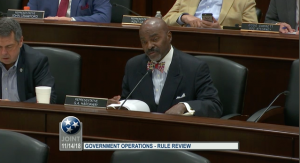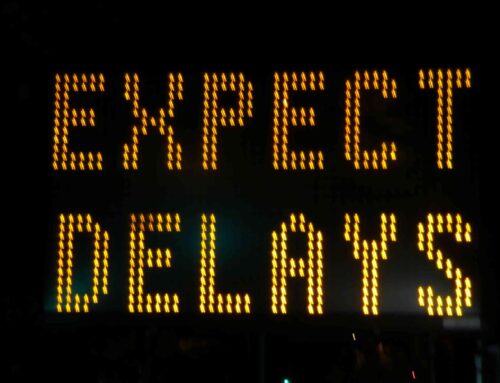Questions about photography ban, ID requirement prompts committee to stop agency’s public records rules
The Joint Government Operations Committee voted today to ask the Department of Financial Institutions to hold a public hearing on its rules related to public records requests after questions about the agency’s proposed ban on photography of records and the requirement of a Tennessee driver’s license or photo ID to inspect or get copies of records.
Some committee members said that hearing public records rules of state agencies during the rule-making process this year has prompted them to believe changes to the public records act are due.
The Department of Financial Institutions is one of many state agencies going through the rule-making process related to public records access. All state agencies are required by law to promulgate rules regarding access by Jan. 1, 2019. Several state agencies will be before the Joint Operations Committee at its December meeting the week of Dec. 17, said the committee’s chairman State Sen. Mike Bell, R-Riceville.
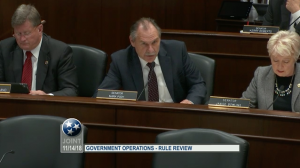
Sen. Mark Pody, R-Lebanon, said he will be suggesting people be allowed to take pictures of public records.
Not all agencies have had public hearings in advance of the appearance before the joint committee, and instead proposed their rules through a different process in which the Joint Government Operations Committee hears the rule, and allows public comment.
At today’s meeting, several lawmakers questioned the Department of Financial Institution’s proposed rule that bans someone from taking photos of public records.
The agency’s rule says “[a] requester will not be allowed to make copies of records with personal equipment, including, but not limited to, cell phones, portable scanners, or portable copy machines.”
Watch the full video of the committee meeting here.
Beginning at 21:46, you can hear questions on the photography of public records ban and answers given by the attorney and liaison with the Department of Financial Institutions
Beginning at about 33:03, you can hear TCOG’s comments.
Beginning at 40:33, questions by lawmakers about the identification requirement begin.
State Sen. Mark Pody, R-Lebanon, asked what would be the downside of someone taking a picture of the public record.
The department’s legislative liaison Todd Staley answered that if they had to make a copy to redact a record so it could be viewed by a requester, they would simply give the requester the copied record as they would have no use for it — causing there to be no need to take a picture of the record. But when asked by Rep. G.A. Hardaway, D-Memphis, if giving the requester a free copy was stated in the rule, Staley admitted that it was not.
“As we look in the future, chairman, I’m going to be suggesting that these public records be open if someone wants to take a picture and except for the redacted (information), they could,” Pody said.
Hardaway also asked if a requester would be allowed under the agency’s proposed rules to take photos of public records that did not have confidential information on it and therefore did not have to be redacted.
Staley said that scenario was unlikely because “most likely that record would be on the website already” and the agency would direct the requester to the website because the agency “would not create a physical copy of a record that is already available electronically.”
Hardaway said this did not answer his question and that he realized he was not going to get a straight answer. So he said he would work with Sen. Pody on language “to do the things we are trying to do and that’s to ease the process by which citizens can access their information. It’s public information and that means it belongs to the public and we shouldn’t be putting barriers in the way.”
“As much as I hate to admit this, my gentleman friend from Shelby County may be onto something,” said State Rep. Jeremy Faison, R-Cosby, before moving to ask the agency to make modifications to its rules to consider Rep. Hardaway and Sen. Pody’s points.
Lawmakers then turned to the public comments section.
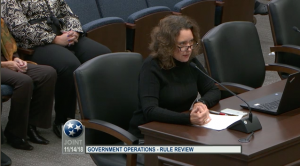
TCOG Executive Director Deborah Fisher shares that journalists who work for Tennessee news organizations have been denied access to public records because they live over the state line from Chattanooga, Bristol and Memphis.
During the public comment section, as TCOG’s executive director, I shared how the requirement of a driver’s license or photo ID by state agencies was causing delays in access to public records and hindering access. Journalists who work for Tennessee news organizations in Bristol, Chattanooga and Memphis have been denied access to public records because they lived over the state line.
I suggested on behalf of TCOG that the requirement was overkill, and that a better way might be to allows residents to check a box or verbally confirm they are resident. I also suggested that journalists who work for Tennessee news organizations be allowed access to public records, and not denied if they have an out-of-state residency, such as in one of the border states.
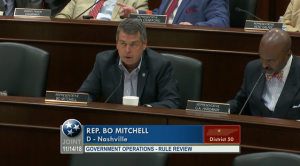
State Rep. Bo Mitchell, D-Nashville, said he didn’t understand why state agencies are trying to make it hard for the public to access public records. “Let’s fix this come January so we don’t have to go through this 20 more times.” State Sen. Mike Bell, R-Riceville, said he agreed with Mitchell and that the “larger issue needs to be addressed.”
At least three lawmakers expressed concern that the rules were making it too hard to access public records and that the process should be easier.
Rep. Bo Mitchell, D-Nashville, complained that the committee was hearing the same barriers to access to records repeatedly as state agencies brought rules before them, and suggested that legislation be brought in the next session.
“I think we need to address this in the upcoming session, and in a bipartisan way, and make sure citizens of this state or any news organization or press, or anyone who may be concerned about something in this country has access to public records,” Mitchell said. “This seems ludicrous that we’ve went through this exercise every month with every department. I just don’t understand why we are trying to make it so hard for the public to get their records. With that being said, let’s fix this come January so we don’t have to go through this 20 more times.”
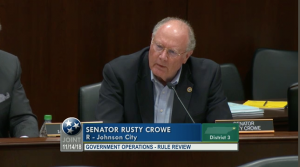
Sen. Rusty Crowe, R-Johnson City, said he didn’t think a driver’s license or photo ID should be required for a records request, and that a checkbox on a form would work just as well.
Sen. Rusty Crowe, R-Johnson City, said while he thinks the voter I.D. law for elections was very important, he saw no problem with allowing someone to check a box on a public records request form “under penalty of perjury” stating they are a Tennessee resident. “That makes a lot of sense, and as the representative has said, these are public records,” Crowe said. “We do need to look at the entire public records act to see what can be done.”
Hardaway also questioned the agency on the ID requirements.
Bell, who is also on an ad hoc Open Records Committee, said he agreed with Mitchell that the “larger issue needs to be addressed. And it’s something we need to look at, and something I’ve been looking at.” For now, he suggested that one option was for the committee to require the Department of Financial Institutions to have a public hearing and that “would stop the rule-making process in its tracks.” This would give the department, at the least, to consider adjusting their rules.
Faison, R-Cosby, who is also on the Open Records Committee, made a motion to ask the agency to have a public hearing on the issues.
The one lawmaker who defended the ID requirement was state Sen. Janice Bowling, R-Tullahoma. She said she was a former alderman and some people who requested records were harassing local government. She suggested that rules such as the ID requirement were important to slow those people down.

